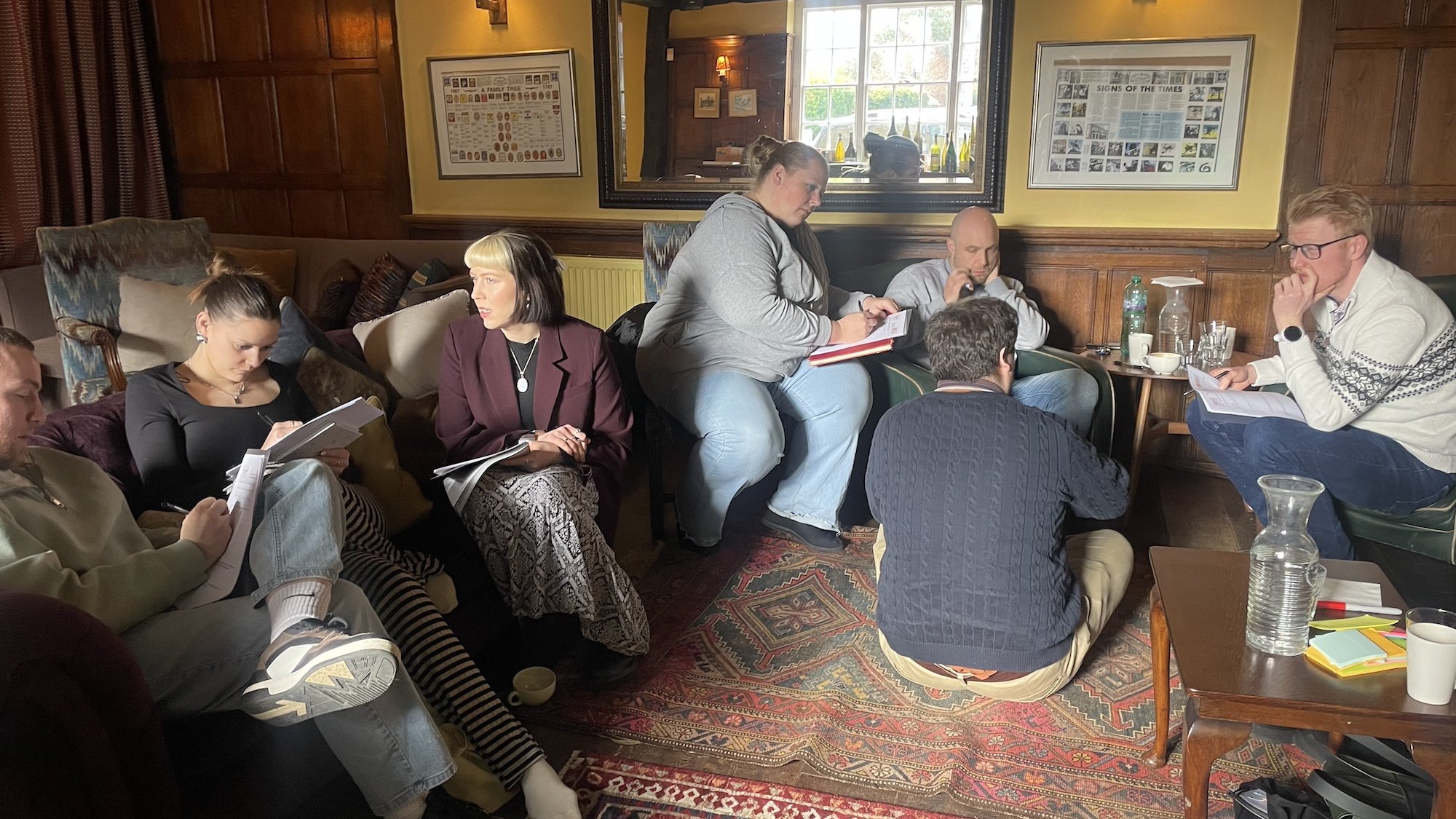
BLOG
Inspiration and news
Planning an Offsite or Away Day? Start With These 10 Questions
Planning a leadership offsite or team strategy day? These 10 essential questions will help you design a session that delivers clarity, connection and real results — not just good intentions.
If you’re planning a leadership off-site, strategy workshop or team away day, pause before you start booking venues or building slides.
Off-sites, Workshops, and Team Away Days can build trust, clarity, and momentum, or leave your team asking, “What was the point of that?”
Before sending the calendar invitation, ask these ten questions to help you design an off-site that delivers meaningful results and avoid the “nice lunch, no outcomes” trap.
10 Questions to Answer before holding an Off-site, Workshop or Away Day
1. What are we trying to achieve?
Every offsite should have a clear why. Without it, the day risks feeling vague or performative. Being clear on the purpose shapes everything: format, facilitation, outcomes, and energy. Without this clarity, the day risks feeling vague or performative. Ask:
What’s the problem or challenge we’re trying to solve?
Is it to solve a problem (misalignment, disconnection, lack of clarity) Is it to respond to a shift (new CEO, strategy change, growth) or is it to unlock new ideas and momentum?
Why now?
Try this: Write your purpose in a single sentence — and use it to brief your team, venue or facilitator.
2. What outcomes do we want?
Get specific. Whether your off-site, away day or workshop is about setting strategic priorities, exploring culture and values, building trust, communication or collaboration. Outcomes don’t need to be rigid but they should be meaningful, specific, and linked to business needs. Ask:
What decisions do we want made?
What conversations need to happen?
How will we know if the day has been successful?
0
3. Who should be in the room and why?
The impact of your session depends on who’s involved. Off-sites are more impactful when the right people are present and when you’re clear on what each person brings. Consider:
Are we including decision-makers and people with insight and lived experience?
Are we bringing the right mix of perspectives, roles and personalities?
Do we need external stakeholders, new hires or future leaders in the room?
Is there anyone whose absence will limit our ability to move forward?
4. What do we want people to think, feel and do afterwards?
A successful offsite should shift something mindset, motivation, behaviour, or direction. Avoid vague goals like “alignment” or “team bonding.” Ask:
What impact do we want this to have?
What new behaviours do we want to see?
What conversations are overdue?
What actions should people commit to?
5. What’s likely to get in the way and how will we handle it?
Tension, cynicism, unspoken issues, unresolved conflict, cynicism or fatigue. Every offsite has potential blockers. Ignoring them doesn’t make them disappear, but designing with them in mind makes the day more honest, useful and inclusive. This is where a skilled external facilitator can help to surface the tough stuff and move forward constructively.
Ask:
What’s not being said?
What might stop people being honest?
How can we create a safe, inclusive space?
6. Is everyone clear on why they’re invited and what’s expected?
Offsites work when people show up ready to participate, not just spectate. When people feel prepared, they engage more fully and bring better energy to the room. So, make sure people know:
Why have they been invited
What the day is (and isn’t) about
What are they expected to prepare or bring to it?
What kind of mindset is expected
7. How will we balance, structure and flexibility?
Too much structure can kill creativity at an off-site or away day, while too little can lead to chaos. A well-designed day includes:
Time to reflect on the big picture
Space to connect as people
Opportunities to make real decisions
Flexibility to adapt in the moment
A structure around presentations and breakout can feel stale and rigid, so build in movement, variety, and breathing space, so include plenty of opportunity for individual reflection, small-group work, open conversations, and collaborative planning.
8. What will make this feel different to a regular meeting?
Your offsite should feel like a different kind of conversation, not just another agenda-heavy session. The best workshops spark insight because they feel different. Ask:
How can we use a different space or setting? That’s the value in getting away from the office, to somewhere new, away from distractions.
Can we include storytelling, vulnerability or creativity?
How will we make it human, not corporate?
9. How will we make sure this leads to action, not just good intentions?
Too many offsites end with a flurry of ideas and no real follow-through. Creating accountability makes sure you see real shifts. Before the day ends, build in:
Time for decisions, priorities and next steps
Clear next steps and timeframes
Clear ownership (who will do what by when)
A plan to revisit and track progress in a month, a quarter and a year.
10. Should we bring in an external Facilitator?
If you want honesty, momentum, and real progress, consider working with a facilitator. A good facilitator holds the space, creates safety, encourages participation, and ensures real outcomes, not just good vibes. Especially if:
There’s low trust
You need to shift dynamics or challenge the status quo
You want leaders to participate fully, not run the room
You want actionable outcomes
A brilliant offsite doesn’t just happen. It’s designed with intention, curiosity, and care. Start with these questions, and you’ll already be ahead of most teams that simply hope for the best.
Are you planning an Away Day, Off-site or Workshop and looking for support?
Whether you’re planning a leadership strategy day, team away-day, or culture workshop, I’ll help you design and facilitate a session that delivers real outcomes,
We’ll bring people together with purpose, create space for the right conversations, and leave with clarity, connection and action.
If you’ve got ideas, plans or challenges that would benefit from getting people in a room together, I’d love to hear about them.
Give me a call on 07966 475195
Book a time straight into my diary: Calendly >
Email me: polly@pollyrobinson.co.uk
Learn more about Growth Space Workshops & Facilitation >
Not sure if you need a facilitator?
Read my blog: Do I Need a Facilitator for My Away Day?






